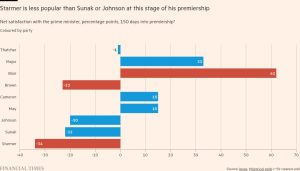Marine Le Pen’s show of force puts France on notice

For more than a decade, France had been accustomed to Marine Le Pen trying to “detoxify” her far-right party’s image and prove it was ready to govern.
By playing a decisive role in the historic toppling of the government this week, she chose to send France’s political class a different message: her Rassemblement National (RN) party can no longer be ignored and must be consulted on policy.
“This is the first time that the Front National or the RN has been in a position to influence public affairs in this way,” Philippe Olivier, a senior figure in the RN who is also Le Pen’s brother-in-law, told the Financial Times, referring to the party’s old name. “We are at the centre of the game.”
But the show of force to oust Michel Barnier’s minority government over his deficit-cutting budget was not without risk — both for the country and Le Pen’s ambitions.
Although President Emmanuel Macron has promised to soon name a new premier, France appears rudderless and at the mercy of markets if no solution can be found to satisfy Le Pen. The hung parliament remains dysfunctional and must soon pass a budget or worried investors may further push up France’s cost of borrowing.
If the perception takes hold that Le Pen has destabilised the country or the economy, analysts say it can undermine the RN’s efforts to attract more white-collar and wealthy voters — key constituencies Le Pen will need to achieve her life-long goal of winning the presidency. Yet inaction would have irritated the RN’s current, largely working-class base, which polls showed overwhelmingly favoured the censure motion.

Le Pen’s calibrated response hours after the RN cast the swing vote hinted that she recognised the dangers. Her gamble is that being seen to shape events in France will convince voters she is ready, along with her party, to hold high office.
“It was not a decision taken lightheartedly,” she told TF1 television on Wednesday night, adding that it was necessary to “protect the French” from a “toxic budget”. Nor would the RN reflexively obstruct the next prime minister. “We will let the person work,” she said, with the goal of coming up with a new budget acceptable to parliament.
Le Pen’s political opponents do not buy her explanations for turning against the Barnier government, arguing instead that it stems from her legal woes. Prosecutors trying her and other RN officials for allegedly embezzling EU funds last week asked for her sentence to include a ban from holding public office for five years, effective immediately before any appeals.
With the verdict expected in late March, many rivals argue that Le Pen went on the offensive now, not only to change the subject, but also to crank up pressure on the president to resign early to resolve the political gridlock. Winning an early election to succeed Macron might allow her to take office before any ban went into effect.
She has repeatedly denied that the criminal case has any bearing on her actions. But she has been more insistent in blaming Macron for the current turmoil, although she always stops just short of calling for him to resign: “I am not pushing. He will do what his reason and conscience dictate to him.”
When Macron dissolved parliament in July to call snap elections, it was certainly not intended to put the RN in a stronger position, although that has been the result. His centrist alliance lost the most seats, while the far-right and a leftist bloc progressed, leaving a hung parliament fractured into three irreconcilable chunks.
In the new assembly, the RN delegation and its allies grew to 140 seats — up from 89 two years ago and eight in 2017. But as a swing bloc, Le Pen had influence: Macron only picked Barnier when she gave her tacit approval not to immediately censure his government.
Bizarre voting patterns soon cropped up in the assembly as political foes occasionally teamed up to pass or torpedo budget amendments. The supposed governing alliance — Macron’s centrists with Barnier’s conservative party — was plagued by internal squabbles; their benches in the lower house were frequently empty, leaving the RN and the left to square off without them.
The tumult came to a head on Wednesday when the RN joined its votes to a censure motion filed by the leftist bloc — an alliance of circumstance that would have once been anathema to both. Le Pen had rejected last-ditch concessions from Barnier.

More than half of French voters approved of the parliament’s censure of Barnier’s government, according to polling by Toluna Harris Interactive immediately after the vote. That rises to 78 per cent among RN voters, the highest of any political group. But whereas voters that support other parties put the greatest responsibility for the ouster on the RN, the party’s backers most blame Barnier.
“The RN’s deputies voted exactly as their supporters asked them to,” said pollster Pierre-Hadrien Bartoli. After the vote, 86 per cent said they approved of the MPs’ actions. RN voters saw “that their ideas are gaining ground in the country [and] they are gaining ground at elections. They don’t want to make alliances and don’t want to compromise”, he said.
Nevertheless, Gabriel Attal, Macron’s former prime minister and head of the Renaissance party, predicted that the RN would come to regret its choice to push the country into crisis since it would turn off voters.
“Despite years of effort to try to convince the French that you are responsible and ready to govern, what this moment confirms is that it was all hot air,” Attal said. “You are making a mistake before history, but you cannot help it. You can’t help yourself; it’s your nature.”
The RN dismissed the idea that its voters would abandon them for voting out Barnier. Jean-Philippe Tanguy, a senior RN lawmaker, criticised the government for what he called “project fear” warnings of economic fallout, predicting that there would be little disruption since an emergency stop-gap budget would soon be passed.
Luc Rouban, a political scientist at Sciences Po whose latest book analysed the RN electorate, said much would depend on whether the censure vote opened a period of prolonged political dysfunction or financial upheaval.
“I think they will come out of this period relatively well in the end,” he said. “The question is whether Le Pen has gotten short-term political benefit, while damaging her long-term political prospects.”
Le Pen is already preparing for the next phase whatever the new government does. “We will adapt. That is Marine’s strength, to always adapt,” said Tanguy. “If our opponents always knew what we were going to do, we would be weak.”
#Marine #Pens #show #force #puts #France #notice






